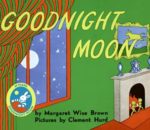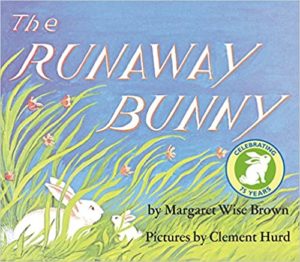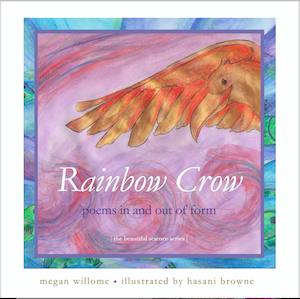There are some young people — be they little boys and girls or little bunnies — who want to run away from their mothers. That is why Margaret Wise Brown begins her story like this: “Once there was a little bunny who wanted to run away.” We don’t know why he wanted to run. There’s no apparent tragedy he’s running from; he’s just a runner.
He is a bit like the man in the song Colder Weather by the Zac Brown Band. (Yes, I know the song is about heartbreak between a grown man and a grown woman, but there aren’t enough heartbreak songs for parents and kids.)
“You’re a lover, I’m a runner
And we go round and round”
Some bunnies are like that.
For a long time Brown had been kicking around a story idea drawn from a rather dark French ballad about a woman trying and failing to leave a man. During a ski trip at Mount Greylock in Massachusetts, Brown finished her run down the slope, holed up in a warm shack while she waited for her friends to come in from the cold, and dashed off the story on the back of her ski receipt.
The little bunny in this book does not actually run. Instead he discusses with his mother the idea of running away. Whatever wild form the little bunny imagines himself, his mother bunny is there, wilder still. She knows, in the words of the song, “her love is strong enough to make him stay.”
After the little bunny announces his intent, he describes seven ways he will run away. And seven times the mother bunny comes back with a calm retort of how she will thwart his plan. She will fish, climb, garden, wait, blow, walk on air, and finally, catch her little bunny. He is clever, but she is steadfast.
My favorite exchange is the one in the middle of the story, the one which is more passive than the others:
If you become a bird and fly away from me,”
said his mother, “I will be a tree that you come home to.”
This mother bunny will wait. She will not be the tree he comes home to, but she will be a tree. He has to come home somewhere. Might as well be to her, in disguise.
Throughout the book, Clement Hurd’s pictures alternate between black and white, for the bunnies’ conversation, and full color, for the imagined truth behind their words. In the bird-tree illustration the little bunny has pink wings and the mother bunny is covered in green leaves, her arms outstretched, her legs in mid-run toward her child.
If you notice something familiar in the illustration of the mother bunny holding the little bunny in a rocking chair, that’s because the same picture appears in another collaboration between Margaret Wise Brown and Clement Hurd: Goodnight Moon. 
What has always fascinated me about The Runaway Bunny is that the mother bunny never says “I love you” to her little bunny. She offers no words of tenderness, no affectionate hug. She simply wears the little bunny down. The story does not end in repentance, with the little bunny saying, “I’m sorry I caused you pain, dearest Mother Bunny.” Nope. He gripes, “Shucks, I might just as well stay where I am and be your little bunny.”
The sensible mother bunny replies, “Have a carrot.” She gets the last word.
I once heard a father say he thought this story was twisted. He thought the mother bunny was obsessed with the little bunny, that she was the kind of mother who would sleep on the door mat outside her son’s dorm room.
Only to make sure he received the box of carrots she’d sent.
In the Zac Brown song, the couple never does get back together. With the passage of time, the man realizes their breakup is his own fault, not the fault of “colder weather.”
“Cause I’m a ramblin’ man
I ain’t never gonna change
I’ve got a gypsy soul to blame
And I was born for leavin’”
Some little bunnies do run away. Some mother bunnies turn into trees, anchored to the earth, in a constant of state of mid-run, waiting for a homecoming. Ready with a carrot.
_______________
This month we are memorizing a poem by Margaret Wise Brown called Song of Summer. It describes not colder weather, but what’s happening during the warmer months, from April through until the first of September. Join us? It’s an easy, breezy, summery one!
The next Children’s Book Club will meet Friday, July 10. We’ll read Wave by Suzy Lee, a wordless picture book that tells a story about a girl’s day at the beach.
Photo by Pierre PRESTAT, Creative Commons, via Flickr. Post by Megan Willome.
Browse more Children’s Book Club
“Megan Willome has captured the essence of crow in this delightful children’s collection. Not only do the poems introduce the reader to the unusual habits and nature of this bird, but also different forms of poetry as well.”
—Michelle Ortega, poet and children’s speech pathologist
- Perspective: The Two, The Only: Calvin and Hobbes - December 16, 2022
- Children’s Book Club: A Very Haunted Christmas - December 9, 2022
- By Heart: ‘The night is darkening round me’ by Emily Brontë - December 2, 2022




Monica Sharman says
My very favorite Margaret Wise Brown book. Thank you for the backstory about the French ballad and the ski receipt!
Many years ago, when I was talking with a friend about picture books, she said she didn’t let that book in her house because she just didn’t want her kids to read anything about running away. That conversation made me sad. For me, the book incites absolutely no thoughts or desires to run away — in fact, quite the opposite.
It is a work of genius, multi-layered, subtle (as you mentioned, the mother bunny “offers no words of tenderness, no affectionate hug”). I love the “Have a carrot” ending.
Thank you for these great thoughts on a great book!
Megan Willome says
I’m so glad to know you’re a fan of this book too, Monica! I loved learning about the book’s origins. It made my decision to pair it with the Zac Brown song seem not so farfetched after all.
Sandra Heska King says
When I threatened to run away, my mother always offered to help me pack. She also didn’t offer to be home when (and if) I got back. Sort of made me feel like I could “hurt” her more by staying.
Love the ski receipt. Proves you can whip out some words on anything at hand.
Megan Willome says
Your mother sounds like she had a few things in common with Margaret Wise Brown.
Reading the biography, I’m amazed at how prolific she was and how attuned she was to the people and situations around her and how they might be turned into stories for children.